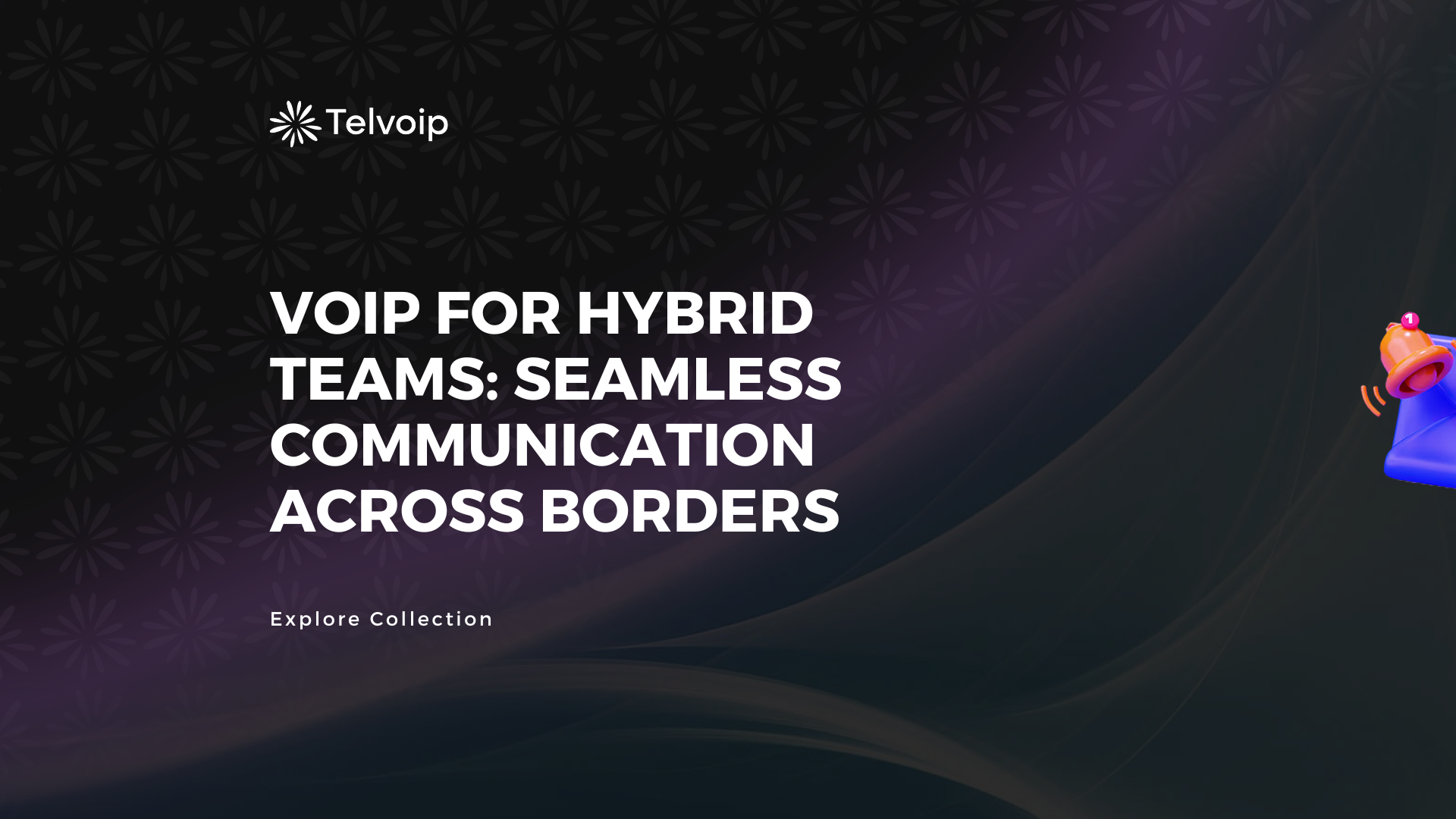Introduction
As hybrid work becomes the new normal, companies are challenged to maintain seamless communication across diverse locations and time zones. Whether teams are working from home, in the office, or halfway across the globe, staying connected is non-negotiable. However, with this flexibility comes a significant challenge: how to keep everyone connected, productive, and collaborating smoothly, regardless of their location? Enter VoIP (Voice over Internet Protocol), the technology quietly powering seamless communication across borders.
VoIP (Voice over Internet Protocol) is a powerful communication solution that uses the internet to make voice and video calls. For hybrid teams, VoIP eliminates the boundaries of traditional phone systems, enabling flexible, reliable, and cost-effective communication.
In this article, we explore how VoIP, particularly Telvoip, enables hybrid teams to collaborate seamlessly, regardless of their location.

Why Hybrid Teams Need Reliable Communication Tools
Hybrid teams operate in dispersed environments, which can easily lead to miscommunication, delays, or team disconnection without the right tools. Traditional landlines or even mobile phones can’t keep up with the flexibility and integration needs of today’s workforce.
VoIP platforms like Telvoip offer a unified communication experience across devices and locations. With cloud-based systems, hybrid teams can maintain the same level of connectivity as fully in-office teams, minus the overhead and technical limitations.
How VoIP Empowers Hybrid Work
- Flexibility and Mobility
VoIP lets your team work from anywhere. Whether you’re at home, in a coworking space, or halfway around the world, you can make and receive business calls on your laptop, smartphone, or desk phone. Your business identity stays consistent, no matter your location.
- Cost Efficiency
Traditional phone systems can rack up huge bills, especially for international calls. VoIP routes calls over the internet, slashing costs for long-distance and international communication. Plus, it’s easy to scale up or down as your team grows; no expensive hardware is required.
- Enhanced Collaboration Features
VoIP isn’t just about voice calls. Most platforms offer video conferencing, instant messaging, file sharing, and integration with your favorite business tools (like CRM or project management apps). This means your team can collaborate in real time, share documents, and stay in sync all within a single platform.

Benefits of VoIP for Hybrid Teams
In a hybrid work environment where team members are split between remote and in-office locations, communication can easily become fragmented. VoIP (Voice over Internet Protocol) solves this challenge by providing a unified, flexible, and cost-effective communication system that works from anywhere with an internet connection. Here are the key benefits VoIP brings to hybrid teams:
- Global Accessibility and Location Flexibility
VoIP allows employees to make and receive calls using the same number across multiple devices, whether they’re working from home, the office, or abroad. This location independence is essential for teams spread across different cities, countries, or time zones.
Benefit: Hybrid teams stay connected and reachable at all times, without being tied to traditional phone systems.
- Lower Communication Costs
Traditional phone systems often come with expensive infrastructure, high international calling rates, and hidden fees. VoIP eliminates these costs by routing calls through the Internet.
Benefit: Companies save significantly on local and international communication while avoiding hardware investments.
- Device Compatibility and Mobility
VoIP works across desktops, laptops, smartphones, and tablets. Employees can take their office line with them on the go and transition smoothly between devices.
Benefit: Whether in a meeting, commuting, or working remotely, employees remain connected without interruption.
- Unified Communication Features
Beyond voice calls, modern VoIP systems include video conferencing, instant messaging, voicemail-to-email, file sharing, and more, all from a single interface.
Benefit: Hybrid teams can collaborate in real time and asynchronously without switching between multiple apps.
- Easy Scalability
Adding new users or departments is simple with VoIP. As your team grows or contracts, licenses can be adjusted without requiring new hardware or complex setups.
Benefit: Businesses can scale up or down with minimal friction, making VoIP ideal for dynamic hybrid teams.
- Business Continuity and Disaster Recovery
VoIP systems are cloud-based, meaning they aren’t tied to a physical office. In the event of outages, natural disasters, or travel disruptions, employees can still access their communication tools from anywhere.
Benefit: Keeps operations running smoothly, even in the face of unexpected disruptions.
- Centralized Management
VoIP platforms typically come with a web-based admin dashboard that allows managers to monitor activity, assign user roles, manage permissions, and analyze communication patterns.
Benefit: IT teams and supervisors can oversee communication performance across the hybrid workforce with ease.
- Professionalism Across All Touchpoints
VoIP systems allow for branded voicemail greetings, centralized numbers, call queues, and virtual receptionists. This ensures consistency in how clients and partners experience your business, regardless of which team member they reach.
Benefit: Enhances customer trust and reinforces brand professionalism, even across a decentralized team.
- Real-Time Analytics and Reporting
With built-in analytics, VoIP systems can track call duration, missed calls, response times, and other performance metrics.
Benefit: Helps businesses identify bottlenecks, improve customer service, and make informed decisions based on actual usage data.
- Integration with Other Tools
Many VoIP platforms integrate with CRMs, help desks, calendars, and project management tools, helping hybrid teams streamline workflows and reduce app overload.
Benefit: Boosts productivity by connecting communication with your team’s daily tools.
VoIP is more than a modern replacement for landlines; it’s a flexible foundation for smarter, more agile communication. For hybrid teams that prioritize connectivity, productivity, and cost-efficiency, VoIP is a must-have technology

Key VoIP Features Hybrid Teams Should Look For
Not all VoIP platforms are created equal, especially when supporting hybrid teams across time zones, regions, and work styles. Choosing a provider like Telvoip that offers robust, flexible, and user-friendly features can make all the difference.
Here are the must-have features that hybrid teams should prioritize:
- Multi-Device Access & Softphones
Hybrid team members should be able to communicate from any device, laptop, desktop, tablet, or smartphone.
- Telvoip supports softphone functionality, allowing users to make and receive calls directly from an app or web browser.
- Device switching is seamless. Start a call on your laptop and continue it on your phone.
- Ideal for remote work, travel, or hot-desking setups.
Benefit: Team members stay connected without being tied to a specific location or device.
- Cloud-Based PBX (Private Branch Exchange)
A cloud PBX replaces outdated, physical phone systems and brings flexibility and scalability to your communication infrastructure.
- Enables custom call flows, voicemail boxes, ring groups, and more, all accessible via the cloud.
- No need for on-premise hardware or IT overhead.
Benefit: Maintain full phone system functionality while operating from anywhere in the world.
- HD Video and Audio Conferencing
Meetings are a core part of hybrid collaboration. Poor call quality can lead to frustration and inefficiency.
- Support for large group meetings, screen sharing, virtual whiteboards, and meeting recordings.
Benefit: Replace Zoom or Google Meet with an all-in-one tool, reducing costs and app fatigue.
- Smart Call Routing & Auto Attendant
Hybrid teams often span multiple time zones and departments. Smart routing ensures every call reaches the right person.
- Telvoip offers intelligent auto-attendants, IVR menus, and time-based call routing.
- Customize call flows based on office hours, departments, or language preferences.
- Set backup routing paths for missed calls or offline agents.
Benefit: Customers and colleagues always reach the right contact without delay.
- Team Messaging & Internal Collaboration Tools
Beyond voice, teams need quick ways to collaborate internally.
- Telvoip integrates team chat, file sharing, and message threads within the same platform.
- Eliminates the need for switching between Slack, WhatsApp, and email for simple communication.
Benefit: Keeps communication centralized, searchable, and streamlined.
- Integration with Business Tools
Your VoIP solution should work well with the platforms your team already uses.
- Telvoip integrates easily with CRM systems, project management tools, Microsoft Teams, Google Workspace, and more.
- Enables features like click-to-call from your CRM, logging calls automatically, and syncing calendars for scheduling.
Benefit: Boost productivity and reduce manual logging with seamless tool integration.
- Voicemail-to-Email & Transcription
Busy teams don’t always have time to listen to voicemails.
- Allows for faster responses and easy record-keeping.
Benefit: No more missed messages, even when you’re in a meeting or offline.
- Call Recording & Compliance Support
Recording calls is essential for training, legal compliance, and quality assurance.
- Telvoip offers automatic and on-demand call recording with secure storage and access controls.
- Recordings can be downloaded or reviewed for coaching, performance evaluation, or resolving disputes.
Benefit: Stay compliant and build a better customer experience with quality oversight.
- Analytics, Reporting & Dashboards
Without data, it’s hard to manage remote team performance or customer service quality.
- Telvoip’s analytics dashboard offers real-time and historical insights into:
- Call volumes
- Response times
- Peak activity hours
- Individual and team performance
Benefit: Use data to optimize staffing, boost productivity, and improve service delivery.
- Security & Encryption
For hybrid teams handling sensitive client or company data, communication security is non-negotiable.
- Telvoip uses end-to-end encryption, secure cloud hosting, multi-factor authentication (MFA), and GDPR-compliant data practices.
- Built-in tools for blocking spam calls, managing access levels, and monitoring threats.
Benefit: Peace of mind that your calls, voicemails, and data are safe no matter where your team is working from.
Bonus: Local Number Portability & International Numbers
If you’re working across regions, having a local presence matters.
- Telvoip allows businesses to port existing numbers or purchase new local/international numbers in over 60+ countries.
- Easily create a local presence in key markets without opening physical offices.
Benefit: Build trust with customers and partners in global regions by appearing local.

Challenges and How to Overcome Them
While VoIP offers powerful solutions for hybrid teams, implementation isn’t always plug-and-play. Businesses often face a few common hurdles when shifting from traditional systems or coordinating across distributed teams. Here’s a breakdown of the major challenges and how VoIP providers like Telvoip help solve them.
- Bandwidth Limitations and Network Reliability
Challenge:
VoIP depends heavily on stable internet connections. In areas with limited bandwidth or inconsistent network infrastructure, call quality can suffer, leading to dropped calls, jitter, or delays.
How to Overcome It:
- Telvoip is optimized for low-bandwidth environments, making it an ideal solution for teams operating in regions with limited internet speed (e.g., parts of Africa, rural areas, or remote work hubs).
- Features like adaptive audio compression and intelligent call routing ensure call quality remains high, even when internet speeds fluctuate.
- Businesses should also prioritize network upgrades where possible and dedicate bandwidth for VoIP traffic to reduce congestion.
Pro Tip: Telvoip’s team provides onboarding consultation to help teams assess and improve their network environment for better VoIP performance.
- Security Concerns with Internet-Based Calls
Challenge:
VoIP operates over the internet, which can expose businesses to cyber threats like call interception, eavesdropping, phishing, or denial-of-service (DoS) attacks.
How to Overcome It:
- Telvoip offers end-to-end encryption, secure data storage, and built-in security protocols to ensure communications are protected.
- Supports multi-factor authentication (MFA), IP whitelisting, and admin-level access control to prevent unauthorized usage.
- Regular software updates and 24/7 security monitoring protect against vulnerabilities.
Pro Tip: Train employees on VoIP-specific security best practices, such as recognizing phishing links and using strong, unique passwords for their Telvoip accounts.
- Resistance to Change and Technology Adoption
Challenge:
Team members may be resistant to switching communication tools, especially if they’re used to traditional phones or already overloaded with apps.
How to Overcome It:
- Telvoip is designed with simplicity in mind, offering an intuitive interface that mirrors familiar phone experiences while adding smart features.
- Onboarding support includes live demos, video tutorials, and step-by-step documentation to help teams adopt the system with ease.
- Telvoip also allows gradual rollout, so teams can start with a small group and scale adoption over time.
Pro Tip: Appoint internal “VoIP champions” or power users to help colleagues get comfortable with the system and answer quick questions during the transition.
- Compatibility with Existing Tools and Systems
Challenge:
Many businesses worry that switching to VoIP will disrupt their current tech stack or require rebuilding internal workflows.
How to Overcome It:
- Telvoip integrates smoothly with leading CRMs like Salesforce, project management tools like Asana, and productivity suites (Microsoft 365, Google Workspace).
- Offers open API access, allowing IT teams to build custom integrations if needed.
- Existing phone numbers can be ported into Telvoip, avoiding disruption in customer communication.
Pro Tip: Conduct a tool inventory and integration audit before migration to ensure all key systems work seamlessly with Telvoip from day one.
- Managing Teams Across Time Zones
Challenge:
Hybrid teams often work in different time zones, leading to communication delays, missed calls, and coordination challenges.
How to Overcome It:
- Telvoip offers advanced call routing based on time zone, ensuring calls are directed to available reps at the right times.
- Automated voicemail forwarding and call scheduling tools help teams plan and log communications effectively.
- Team presence indicators show who is online or available, making it easier to connect at appropriate times.
Pro Tip: Set up customized working hour rules and availability statuses in Telvoip for each region or department.
- Lack of IT Resources or Support Staff
Challenge:
Small and medium-sized businesses often don’t have full-time IT staff to manage a new communications infrastructure.
How to Overcome It:
- Telvoip is fully cloud-based and managed, requiring minimal technical involvement on your side.
- Offers 24/7 customer support, onboarding assistance, and optional account managers for larger teams.
- The admin dashboard is designed for non-technical users to manage settings, users, and reports easily.
Pro Tip: Use Telvoip’s support ticket system and live chat during initial setup to avoid unnecessary delays.
- Ensuring Consistent User Experience Across Devices
Challenge:
Hybrid teams use a mix of personal and company devices. Ensuring a consistent, branded communication experience can be tricky.
How to Overcome It:
- Telvoip provides cross-platform apps with identical interfaces and feature sets across desktop, mobile, and web.
- Teams can configure personalized call settings, business caller ID, and voicemail greetings, keeping everything aligned with the brand.
- IT admins can remotely manage device settings and user roles from the centralized admin console.
Pro Tip: Create a VoIP use policy that outlines device setup, etiquette, and support channels to ensure consistency.
No digital transformation is without its hurdles, but with the right partner, the shift to VoIP becomes an opportunity rather than a disruption.
Telvoip is built for the realities of hybrid work: it’s secure, scalable, budget-friendly, and designed to minimize adoption friction. Whether your team is in Nairobi, Lagos, Cape Town, or working globally, Telvoip helps you keep communication reliable and professional.
Top Reasons to Choose Telvoip for Your Hybrid Team
- Africa-Ready Infrastructure: Telvoip is designed with Africa’s connectivity realities in mind, ensuring reliable service even in bandwidth-constrained environments.
- Local Support, Global Reach: Get personalized customer support while benefiting from global-grade features.
- Built for Scale: Whether you’re a startup or a growing enterprise, Telvoip adapts to your evolving communication needs.
- Affordable & Transparent Pricing: No hidden fees, just value-driven packages tailored for hybrid teams.
Conclusion
As the workplace continues to evolve beyond traditional office boundaries, hybrid teams are becoming the norm, not the exception. This shift calls for smarter, more flexible communication tools that empower teams to stay connected, no matter where they are.
VoIP has emerged as the cornerstone of modern, borderless communication. It’s cost-effective, scalable, and built to support the dynamic nature of hybrid work environments. From seamless device syncing to advanced call routing and unified collaboration tools, VoIP platforms eliminate the friction that once made remote teamwork inefficient or unreliable.
But not all VoIP systems are created equal.
That’s where Telvoip stands out. With Telvoip, businesses get more than just a phone system; they gain a full-fledged communication and collaboration platform built specifically for distributed teams. Whether you’re a fast-growing startup with global ambitions or a mid-sized company expanding across regions, Telvoip offers:
- Crystal-clear call quality, even in low-bandwidth areas.
- Smart features like voicemail-to-email, auto-attendants, and video conferencing.
- Advanced security and encryption to protect your conversations.
- Integrations with tools your team already uses, from CRMs to productivity suites.
- 24/7 customer support to ensure your team never misses a beat.
In a world where flexibility is power, Telvoip gives your team the tools to work from anywhere, without compromise. Ready to level up your team’s communication game? [Book a free demo with Telvoip.]








